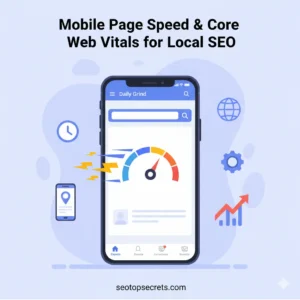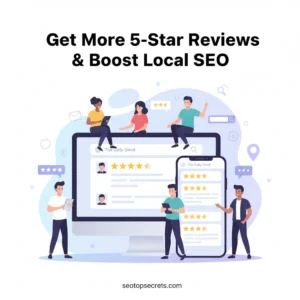For small businesses, local visibility can make or break your success. While global SEO strategies are important, focusing on local SEO ensures your business appears in front of customers near you—exactly when they need your products or services. In this guide, we’ll educate small business owners about 7 essential local SEO factors that can boost your online presence and attract more local customers.
![Modern flat illustration of a computer screen showing a local SEO blog post titled "Local Services in [City]," surrounded by map pins, keywords, and local search optimization icons.](https://seotopsecrets.com/wp-content/uploads/2025/11/Gemini_Generated_Image_1q6jvb1q6jvb1q6j-300x300.webp)
1. Optimize Your Google Business Profile
Your Google Business Profile (GBP) is the foundation of local SEO. It’s what appears in Google Maps and local search results. A complete and accurate profile can significantly increase your visibility.
Tips to optimize your GBP:
-
Ensure your business name, address, and phone number (NAP) are consistent across the web.
-
Add high-quality images and videos of your store or services.
-
Use categories that accurately describe your business.
-
Encourage satisfied customers to leave reviews and respond promptly.
For more on monitoring performance and insights, check out Google Search Console and Google’s official guidelines.
Internal link suggestion: If you want to improve your site’s technical SEO while optimizing your GBP, explore our guide on SEO Audit in 1 Hour.
2. Ensure Consistent NAP Across All Listings
Inconsistent Name, Address, and Phone number (NAP) information across directories can confuse both search engines and customers. Make sure your NAP is identical on:
-
Your website’s contact page
-
Google Business Profile
-
Social media profiles
-
Local business directories
Use structured data (Schema markup) to help search engines understand your business information. Learn more at Schema.org.
Internal link suggestion: For beginners, see our What is On-Page SEO? guide to understand how structured data impacts SEO.
3. Target Local Keywords
Keyword research isn’t just for global SEO. Using location-specific keywords is essential for attracting nearby customers.
Steps to implement local keywords:
-
Include city, neighborhood, or region in titles and meta descriptions.
-
Use local keywords naturally in content and blog posts.
-
Analyze competitor keywords in your area using tools like Google Trends.
Internal link suggestion: Our Step-by-Step Guide to Keyword Research can help small businesses find the right local terms to target.
4. Create Localized Content
Content that reflects your community and services is crucial for local SEO. Blogging about local events, news, or partnerships shows both search engines and users that you are active in your area.
Ideas for local content:
-
Highlight local events or sponsorships
-
Share customer success stories
-
Create city-specific service pages
Internal link suggestion: Learn how to Optimize Blog Posts for SEO to make your content visible to your target audience.
For inspiration, check out HubSpot’s Marketing Blog and Content Marketing Institute.

5. Optimize for Mobile and Page Speed
Local searches are often done on mobile devices, making mobile optimization and fast page speed critical. Google considers mobile experience as a key ranking factor.
Action steps:
-
Ensure your site is mobile-friendly and responsive.
-
Compress images and use lazy loading to improve speed.
-
Test performance with PageSpeed Insights or GTmetrix.
Internal link suggestion: Check out our SEO for Images guide for practical tips to reduce image size without losing quality.
6. Build Local Backlinks
Backlinks from authoritative local websites increase your trustworthiness and visibility. Examples include:
-
Local news outlets or blogs
-
Local business directories
-
Sponsorships or partnerships with local events
Internal link suggestion: If you’re new to backlinks, our Beginner’s Guide to Link Building explains the best strategies without risking penalties.
Also, tools like Neil Patel’s blog and Search Engine Journal offer actionable backlink insights.

7. Encourage and Respond to Reviews
Online reviews impact both rankings and customer trust. Google considers review quantity, quality, and frequency as ranking signals.
Tips for managing reviews:
-
Ask customers for honest feedback on Google, Yelp, or Facebook.
-
Respond to reviews promptly, even negative ones, to show engagement.
-
Showcase positive reviews on your website.
Internal link suggestion: Learn how smart content updates can impact SEO at Overcomplicating SEO?
FAQ – Local SEO for Small Businesses
Q1: How long does it take to see results from local SEO?
Local SEO improvements can take 3–6 months to show noticeable changes, depending on competition and your efforts.
Q2: Is it necessary to hire a professional for local SEO?
Not necessarily. Small business owners can implement most local SEO strategies themselves using resources like SEO Basics for Beginners.
Q3: Can I optimize my website for multiple locations?
Yes, you can create separate landing pages for each location with unique content and local keywords.
Q4: Do reviews really affect search rankings?
Yes, Google uses review signals in local search algorithms. High-quality, frequent reviews improve visibility and trust.
Q5: Are social media profiles important for local SEO?
Absolutely. Profiles like Facebook and Instagram help establish authority and provide additional local signals.
Focusing on these 7 local SEO factors will help your small business attract more customers, increase online visibility, and compete effectively in your community. Start implementing them today and monitor your progress using tools like Google Analytics and Search Console.
To further boost your local SEO efforts, explore our Top 3 SEO Hacks for Home Service Providers.



